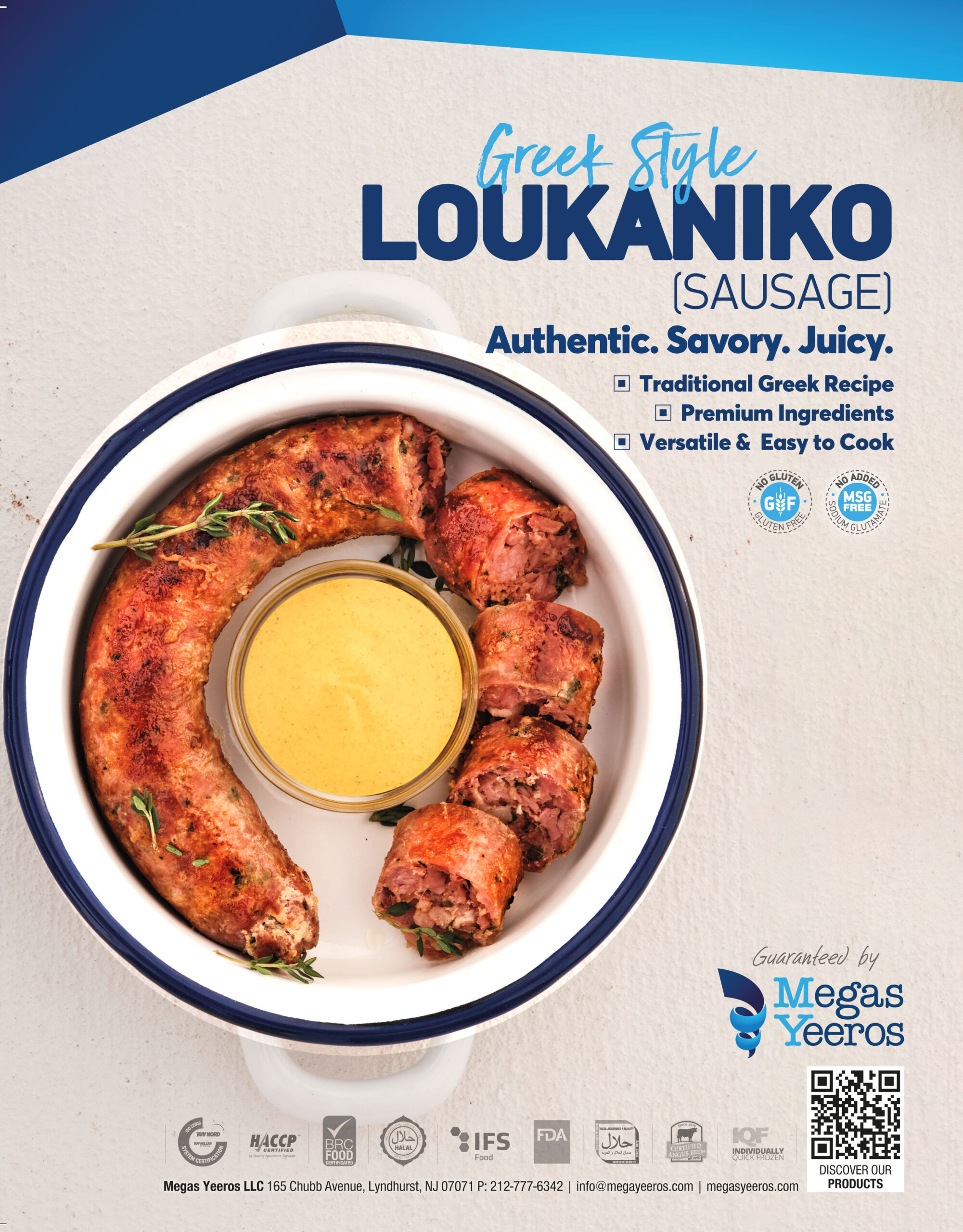Expectations
Posted by estiator at 13 April, at 16 : 52 PM Print
COVER STORY
We may be seeing the dawn of a golden age for Greek wines. Greek producers are expanding their range, harnessing the country’s astonishingly varied terroir. Some are focusing exclusively on Greece’s 300 varieties of indigenous grapes. Small producers, who control every step of the winemaking process, are yielding bottles of world-class quality.
For restaurateurs, the flourishing of Greek wines presents an incredible opportunity to surprise and educate guests, share new stories and experiences, and spotlight food in a new way. As a result, sommeliers have become sought-after on leadership teams at Greek restaurants.
“The days of ‘it’s all bad retsina’? That’s gone,” says Evan Turner, sommelier and wine director at Xenia Greek Hospitality in Boston, whose concepts include Greco, Krasi Meze, and Wine, Agora, and Hecate. “People don’t know a lot about Greek wine, but that’s changing. Cus- tomers are open. Once I find out what they’re in the mood to drink, I take them on a little adventure. I tell them about where the wine’s from, the grape, the winery, and what might impact them as a drinker.”
Some of Greece’s challenges as a wine-making country have become its strongest assets, says Turner, who lived in Greece with his family until the age of 17. “I fell in love with Greek culture, then cuisine, then the wine,” he says. “There aren’t many big wineries in Greece, but there are many wonderful small, organic, artisanal producers and family wineries. What’s big in Greece would be small somewhere like California. That’s part of the charm.”

At the same time, “there’s so much variation. More and more Greek wine is coming online from all over the country, in varietals like Agiorgitiko, Assyrtiko, Xinomavro, and Savatiano.” says Turner, who became a certified sommelier in 2009 after working in food and hospitality in New York. With so much choice, it becomes more important “to explore everything that’s out there” when building a wine list, Turner says. “And if you’re a Greek restaurant, you should have a 100 percent Greek wine list. Wine programs that aren’t 100 percent Greek are silly. There’s so much quality coming out of the country. We can work with menu changes, as our food program is seasonal, and never feel pigeonholed.” In fact, Krasi Meze and Wine boasts the largest Greek wine list in the country.
For Alexandria Brashears, wine and beverage director at acclaimed Chicago “contemporary Greek” eatery Andros Taverna, authenticity and a sense of place are key in building a strong wine program. Andros Taverna is owned by Chef Doug Psaltis and partner Hsing Chen. “It’s a lot easier to have a big list and just check the boxes, but it’s important and compelling to have wine lists that speak to a place and offer a glimpse into a region. It’s more than, ‘I’ve got my Burgundy box checked, I’ve got my Bordeaux box checked,’” she says.
The wine list “should also mirror your cuisine,” says Brashears. “At Andros, the first step in the process is to hear the vision from Doug and the chef team. Not just the food, but the feel.” Likewise, restaurateurs should consider “the temperature of their restaurant,” Brashears says. “What’s the neighborhood like? It is a fine-dining or casual environment? And from the financial side, how much is your customer willing to spend, especially with unfamiliar grape varieties? You have to offer options, but also value.”

Though she oversees the wine program at a high-profile restaurant, Brashears calls herself an “accidental” sommelier. “I was a premed undergrad student in Atlanta, and restaurants were the only work that fit the schedule,” she says. “Once I graduated, I realized I felt happier in restaurants than in clinics or hospitals.” A sommelier worked at a restaurant where Brashears tended bar. “I knew nothing about wine but kept bugging her about why this grape grows here or why that pinot’s different from this pinot. She offered to pay for my certification courses through the Court of Master Sommeliers.” The fact that women were still a rarity in the world of sommeliers never occurred to her. “I was naive. My circle of somms in Atlanta was all women,” she says. “Only later, when I ran in circles more dominated by men, did I realize women were less represented.”
Her career took off fast, with stints at eateries including New York’s famed Eleven Madison Park. Now at Andros—and just-opened Spanish hotspot Asador Bastian, from the same chef— Brashears oversees wine at two of Chicago’s most talked-about restaurants.
“Greek wine can still be a challenge, because there is not a ton on the market,” she says. “But it’s less limiting of an experience than I had imagined. The list can read as very unfamiliar, but diners trust servers and sommeliers, and it’s an easy story to sell people on.” Greek restaurateurs tend to “lean into what may be popular, but you have to consider your food and cuisine, and not just plug in things you know will sell. It takes work to educate your staff, but it’s really beneficial.”
John Kelley, chief sommelier of Baltimore-based Atlas Restaurant Group (whose properties include “Mediterranean kouzina” concept Ouzo Bay in Baltimore and Houston) agrees. “At least in Baltimore, there is a lot of ‘point chasing’ from major wine critics, especially those who might be a little less relevant than they were a few years ago,” says Kelley.
“Point chasing” refers to the insistence on wines that earn high ratings from wine critics. “One of the ugliest facets of the modern wine world is the rise of the point chasers—people who buy wine solely on the basis of [critic Robert] Parker’s ratings,” explains the WineAnorak site.
THE WINE LIST
Estiator’s panel of experts picks their favorites.
It’s an exciting time for Greek wines, with more varieties available from more regions than ever. Estiator asked our panel of experts to share their picks for intriguing wines to keep on your radar for your restaurant’s wine program.
JOHN KELLEY,
chief sommelier, Atlas Restaurant Group, Baltimore
Rose Nico Lazaridi is rough-and-tumble, but very consumer-friendly. I tasted it yesterday. It’s from Macedonia, and clearly a wine built for the export market. It’s a fresh poppy, bitter orange, black mineral kind of thing, and it’s under 20 bucks.
Ktima Kir-Yianni makes a sparkling rosé in the prosecco method with the agiorgitako grape. This wine is just delicious. On a hot, humid day, a glass of this with fresh peaches and prosciutto is as comforting as anything. This wine has this red-fruited, basily, salty-mineral thing that’s crazy refreshing.
ALEXANDRIA BRASHEARS,
wine and beverage director, Eat Well Hospitality, Chicago
Malihin-Chryssos is a producer from Crete. It’s run by a young woman named Illiana Mahalin who has a devoted style of winemaking, using only indigenous Greek varaities. These are really spectacular, delicious wines, and she’s a fresh voice in the Greek wine scene.
Domaine Sigalas makes predominantly Assyrtikos from Santorini. Theirs is a perfect example of what Assyrtiko can be—textural, really interesting, really bright. They make long, age-worthy examples.
Ktima Kir-Yianni was founded by Yannis Boutaris in 1997. He’s a legend. Most people think of the islands when they think of Greece. But if you go to Macedonia, there are tons of snowy mountains. He makes cool, age-worthy reds that are phenomenal food wines.
EVAN TURNER,
sommelier and wine director, Xenia Greek Hospitality, Boston
Ktima Kir-Yianni just makes a beautiful range of gorgeous wines from Northern Greece. I adore their Ramnista Xinomavro.
Alpha Estate is also in the north, and everything they make is glorious. I love their Turtles Vineyard Malagouzia.
Tselepos Wines in Santorini has a wonderful range, including the Tzelepos Canava Chrissou Assyrtiko from Santorini.
ELIANA STEANITSIS,
owner Molos, Weehawken, NJ
Domaine Costa Lazaridi Cabernet blend.
Domaine Skouras Labyrinth is a recent addition for us. The winery is in the Peloponnese.
Alpha Estate Sauvignon Blanc from Florina is a personal favorite.
KAMAL KOUIRI,
general manager/wine director, Molyvos, New York City
PDO* Santorini 2022 Vassaltis, 100% Assyrtiko.
PDO Amyndeon 2019 Hedgehog Alpha Estate, 100% Xinomavro.
PDO Kephalonia 2022 Gentilini Winery 100% Robola and PGI Markopoulo Domaine Papagiannakos 100% Savatiano Old Vines.
*A wine can carry the EU’s PDO quality label— for Protected Designation of Origin—after proving elements like denomination, historical origin, and production area.
“The application of those wines on the table is very minimal,” Kelley says. “And you’re not maximizing your money on those wines, because they already have a huge retail pres- ence. People want a gem. They want to find something they don’t really know. That’s what a Greek restaurant’s wine list should be about.”
For Ouzo Bay and other Atlas restaurants, “we’re trying to establish a narrative, being the expert that guests want their hosts to be, so there’s more of a ticket to a ride,” Kelley says. “Customers are putting themselves in your hands. Finding things off the beaten path will yield wines with a great story and great drink- ability—and bring diners in. That won’t happen if you find things on every other menu, or on the shelf at Total Wine. There are no questions to be asked. And in some cases, the customer already knows they don’t want it.”
Like many sommeliers, Kelley took an indi- rect path to the profession. Trained as a musician, he studied baroque music at Maryland’s McDaniel College, working in restaurants to support himself. “At the end of college, I was at a crossroads of business school, law school, the Coast Guard, or restaurants. I decided I didn’t want any more standardized tests,” he says, laughing.
But the world of wine paralleled the world of music in surprising ways, he says. “When you talk about the experience of art or music or wine, you’re really talking about organization— how things work, how things are put away, how things are built,” Kelley says. “It’s about using your senses in terms of what you’re interacting with. So this was a lateral move, not a pivot.”
Ouzo Bay “has been an interesting animal to tackle,” Kelley says. “The menu’s been in a state of flux, and the wine program is next. A lot of my work is not apparent yet.” Greek wines “remind me of the experience with a lot of Spanish importers 10 or 15 years ago. There seems to be a taking of sides of reactionary traditionalists and radical progressives. But the quality is overwhelmingly great on stuff from Greece that’s landing here.”

In building a list, “I try to teach the people I’m training that you want to find things that are unique and interesting, but you don’t want to go too far with things that are just weird, odd, or experimental, like going back to win- emaking from 1,000 years ago,” Kelley says. “The story gets lost because the sommelier’s narrative becomes a little too important. It’s all about what the chef’s doing and what the res- taurant’s about, not about what I want to drink. The wine list is telling the story of the chef, the family, the owners, the place. And always listen to your guests.”
Eliana Stefanitsis sometimes sees her guests’ eyes light up when she brings Greek wines to tables at Molos, her acclaimed waterfront restaurant in Weehawken, NJ. “People reminisce about their trips to Greece, or remember the Domaine Sigalas Assyrtiko they had in Santorini,” she says. “It’s important to have wines from all over Greece, but wines that are actually good, and not just those that are more heavily marketed.”
Stefanitsis’s focus on wine has paid dividends; Molos won a 2022 Wine Spectator Award, which recognize “restaurants whose wine lists offer interesting selections, are appropriate to their cuisine and appeal to a wide range of wine lovers,” according to the magazine. While the restaurant is operating without a sommelier at the moment, Stefanitsis plans to hire one. “But I’ve always been involved in the wine program,” she says. Molos opened in 2013; its new chef, Michalis Bakakos, “is taking a more modern approach to traditional dishes,” Stefanitsis says.
Molos’s wine list is evolving to complement Chef Bakakos’s menu. “There’s now enough of a range from regions all over Greece to satisfy all tastes,” she says. “And the availability has grown wider. We can get wines from regions we couldn’t access just five years ago. It’s critical for us, as a Mediterranean seafood restaurant, to keep our Greek program alive.”














